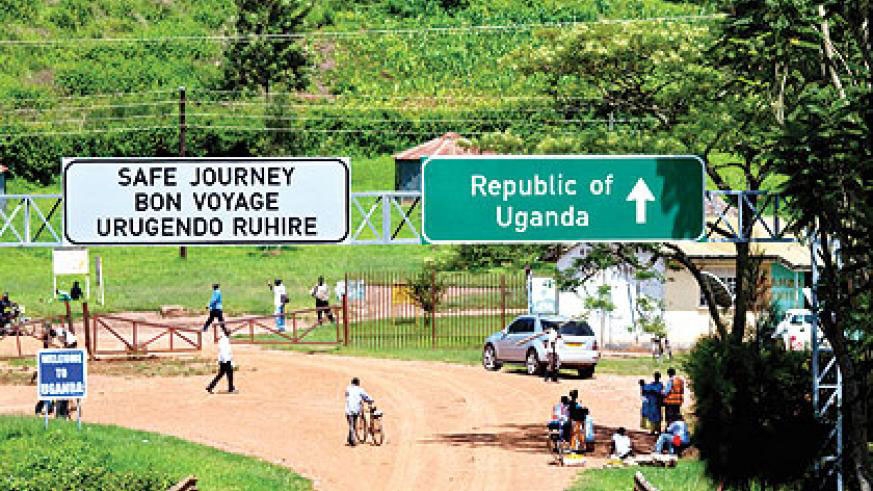Regional
Why is Ugandan press constantly lying about Gatuna border?

Since the closure of the Rwanda-Uganda common border at Gatuna, Ugandan media outlets continuously misled the public
Since the closure of the Rwanda-Uganda common border at Gatuna crossing point, in early 2019, Ugandan media outlets continuously misled people about the reasons behind this sad development and often gave false hope about its re-opening.
This is in the same
line as the article by The Daily Monitor, “Katuna border remains closed two
years since talks started” published on April 4, 2021. It defies
understanding why this newspaper should carry the water for the Ugandan
government which seems to give hope that this border will open soon yet they
know too well that this is as far as the moon.
To back their
falsehood, they quote Ambassador Adonia Ayebale, Uganda’s Permanent
Representative to the United Nations as saying that he was optimistic
"that within three weeks or one month we should have something”. But the
Ambassador quickly distanced himself from Monitor’s misleading assertion saying
that “the quote attributed to me by @DailyMonitor is not correct.”
Another big lie
in the article is the contradiction between unnamed sources in the Ministry of
Foreign Affairs which indicated that little progress has been made to solve the
crisis, and Minister Henry Okello-Oryem himself who insists that there is a lot
going on behind the scenes.
But those who
follow the situation of relations between the two countries closely affirm that
nothing has changed because of Uganda’s unwillingness
to implement the recommendations of the Luanda Memorandum of Understanding (MOU) of August 22, 2019, aimed at normalizing the
frosty relations between the two countries.
It was expected
that the implementation of this MOU would lead to the resumption of free
movement of people and goods between the two countries. Relations between
Rwanda and Uganda became strained after it became clear, in 2017, that Uganda
was supporting terrorist groups such as the Rwandan National Congress (RNC)
operating from the east of the Democratic Republic of Congo. This support is in
the form of recruitment of fighters by arresting Rwandans travelling to Uganda
and coercing them to join the armed militia intent on waging war on Rwanda.
Led by South
Africa-based renegade Kayumba Nyamwasa, the RNC is a terror organisation behind
the spate of grenade attacks that killed people in Rwanda's capital, Kigali,
between 2010 and 2013.
The harassment of
Rwandans by agents of Uganda's Chieftaincy of Military Intelligence (CMI) -
working in cahoots with RNC operatives - continued despite Uganda pledging to
stop the horrific abuses.
In March 2019,
Rwanda therefore issued a travel warning to its citizens because hundreds had
been arrested, detained, tortured, or disappeared. To this date, this has not
stopped. Uganda arrests Rwandan nationals on the false pretext that they are
spies for the Rwandan government.
At the same time,
Rwanda also closed its side of the Gatuna border because truck drivers were
being harassed on the Ugandan side. This affected the long haulage on the
Northern Corridor which impacted the movements of goods heading to eastern DRC,
Burundi, and Rwanda, as well the reverse movement on the Nairobi-Mombasa route.
Ever since this
border's closure, there has been a series of fruitless tripartite meetings
between Rwanda, Uganda, and the mediator Angola. And they were fruitless simply
because Uganda never showed signs of addressing Rwanda’s concerns. To date, Uganda’s support of the
RNC
and other anti-Rwanda groups goes on unabated. Rwandan nationals living or
working in Uganda continue to be targeted.
It has become
routine for Uganda to dump Rwandans - many of them in critical conditions due
to torture - on the border in the thick of the night without following
deportation protocols. Some of these people, it often turned out, had been
languishing in Mbuya military barracks, or other secret locations, before being
dumped at the border.
The most recent
group of Rwandans unceremoniously deported from Uganda were dumped at the
Kagitumba border in Nyagatare region just a few days ago. They all disclosed
that they had been detained at Mbuya military camp by the CMI where they
underwent endless physical and psychhilogical torture. They said that their
torturers accused them of being agents or spies of the Rwandan government.
One of the
returnees, Antoine Twagirimana, from Rubavu District, Western Province, told
reporters that: “I was detained because I was, allegedly, sent by Rwanda to spy
on Uganda. We were detained at Mbuya in awful conditions, with regular
beatings. We left behind two of our pastors.”
The Rwandan
nationals also disclosed that in their detention, all the people brought from
different parts of the country were being recruited into Nyamwasa's RNC. One of them -
known as Nyirimpeta - claimed to have met Gen. Abel Kandiho, the head of CMI,
accompanied by Charlotte Mukankusi, the head of RNC, who insulted him calling
him an idiot who works with President Kagame.
During the Luanda meeting between Presidents Kagame and Museveni on
August 21, 2019, a peace agreement was signed to end the tension between the
two countries. But almost two years on, little or no progress has been made. The hostile posture by Uganda, and especially the continued
harassment of Rwandan nationals, continues.
As The Great Lakes Eye has reported
before, following his recent
re-election, Museveni's actions signal that he is not inclined to permit
peace to prevail.So, media organisations in Uganda should stop misleading the
public by distorting facts.

